from 0 review
14 days
Up to 0 days
Unlimited
___
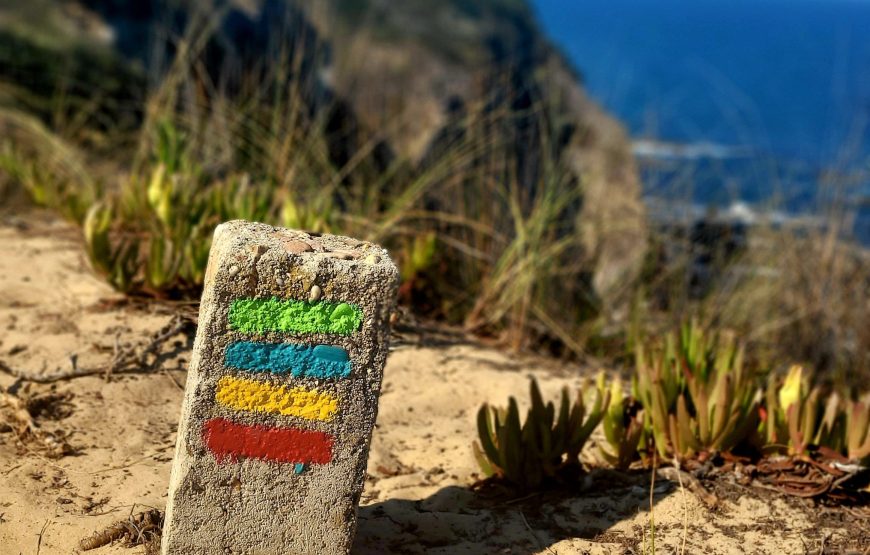
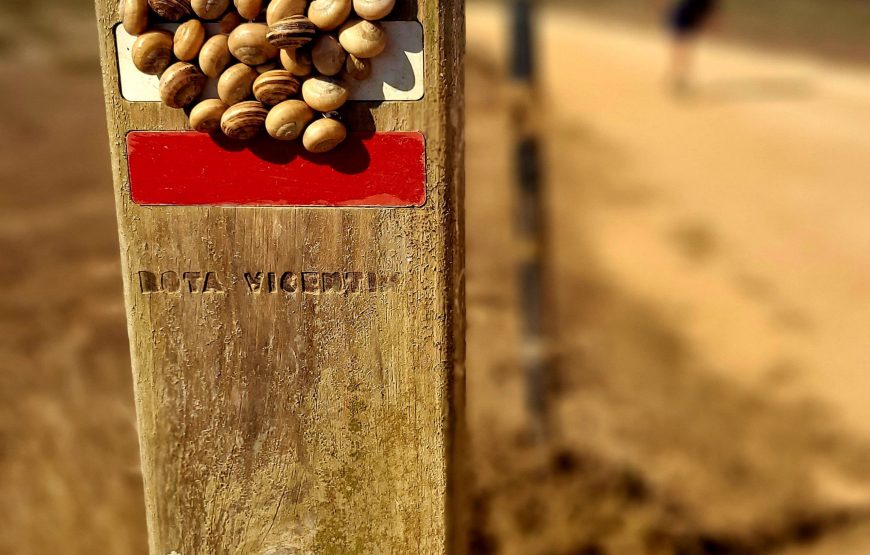
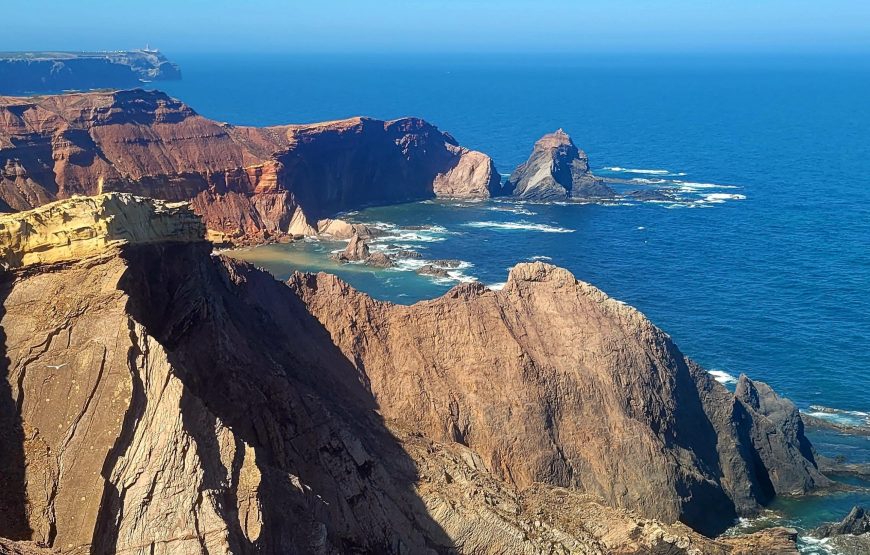
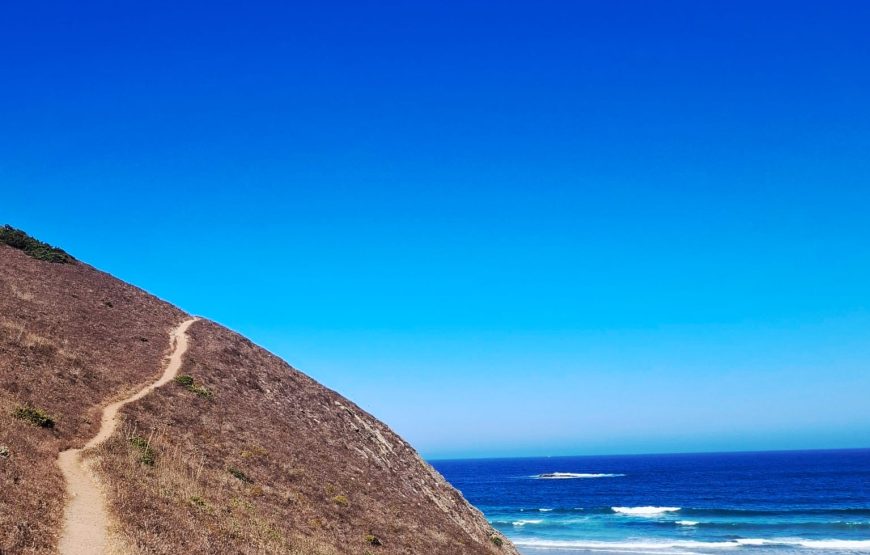
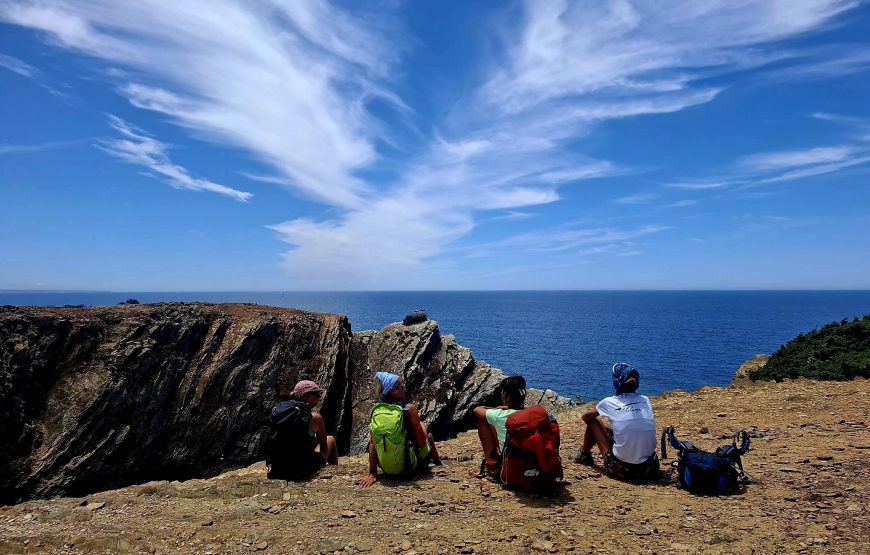
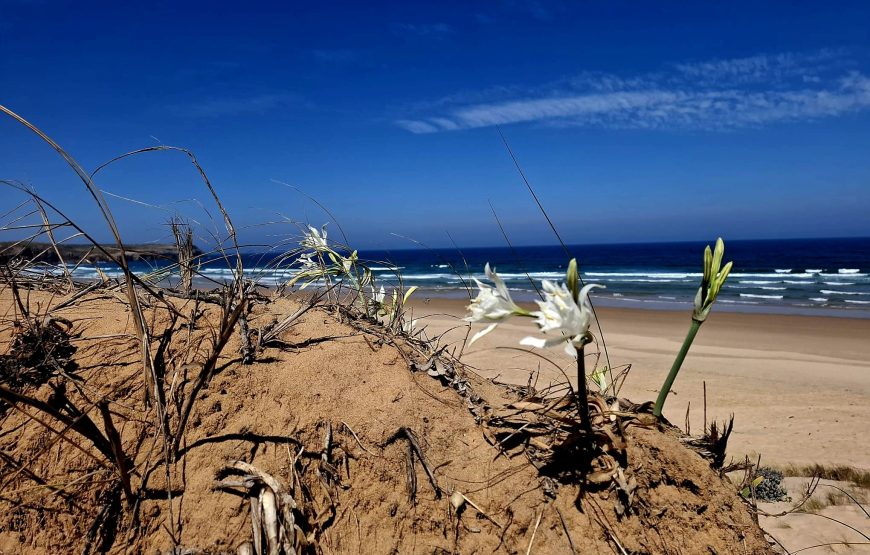
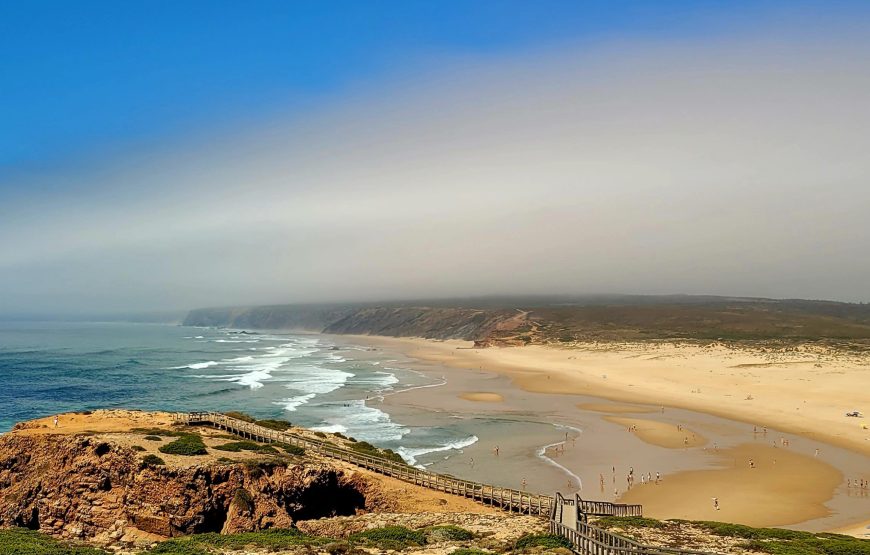
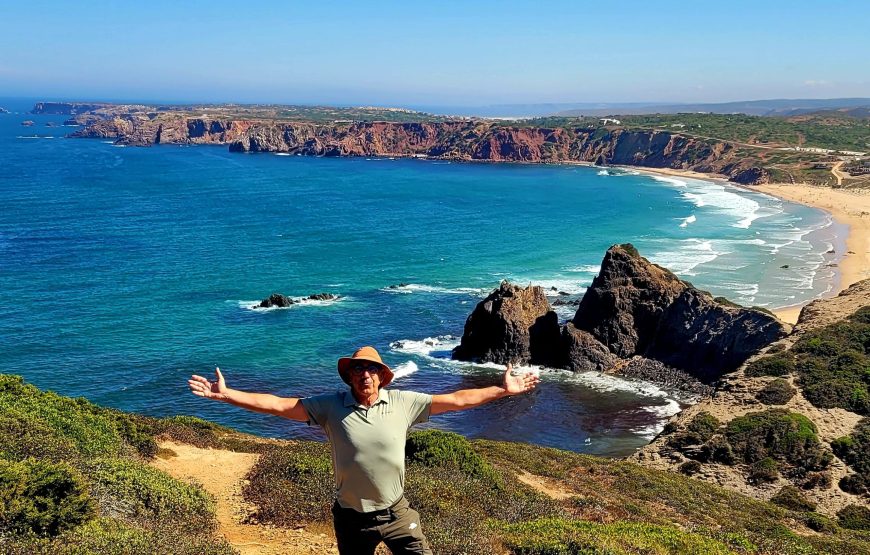
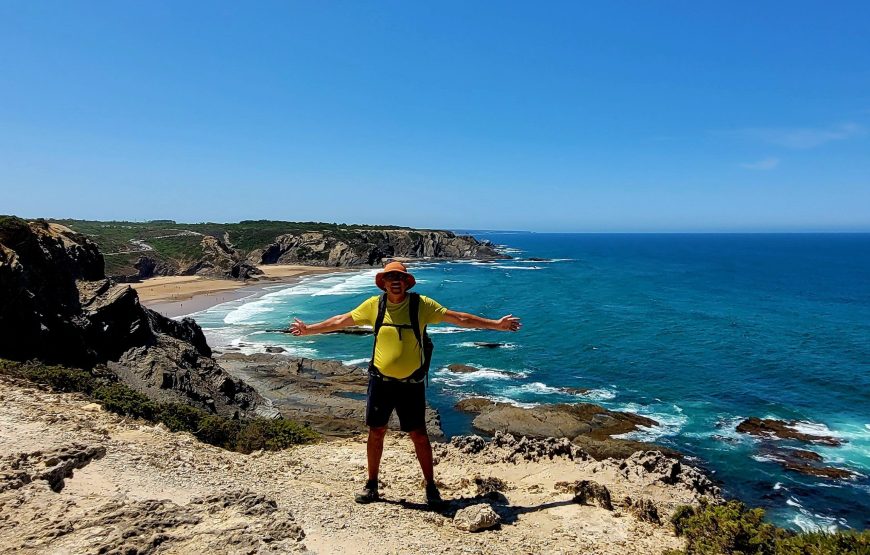
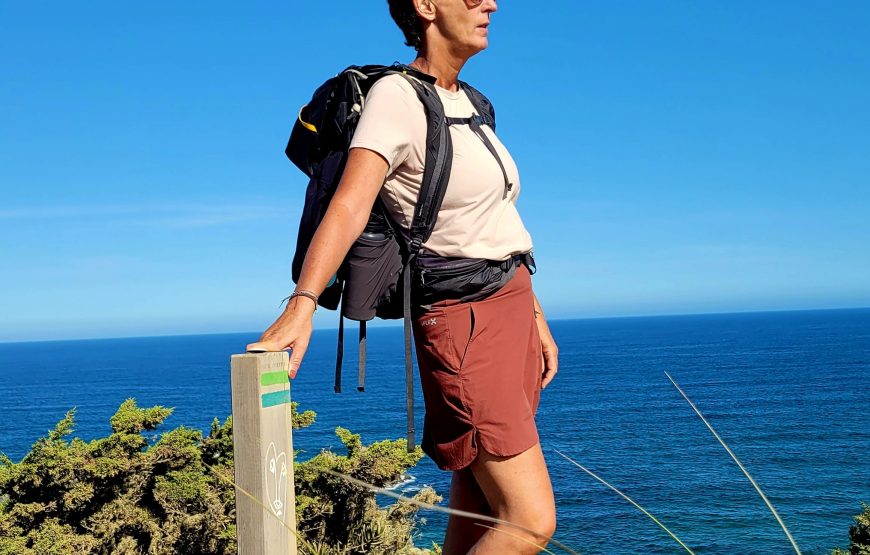
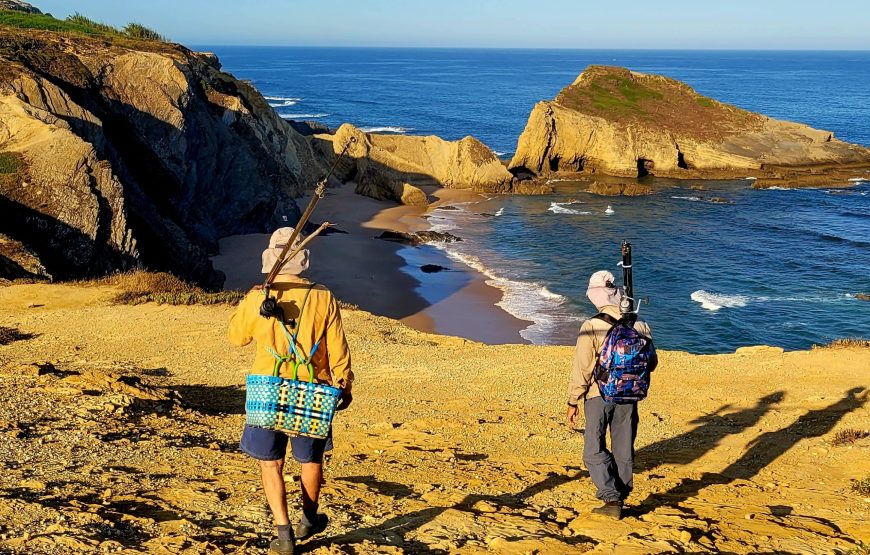
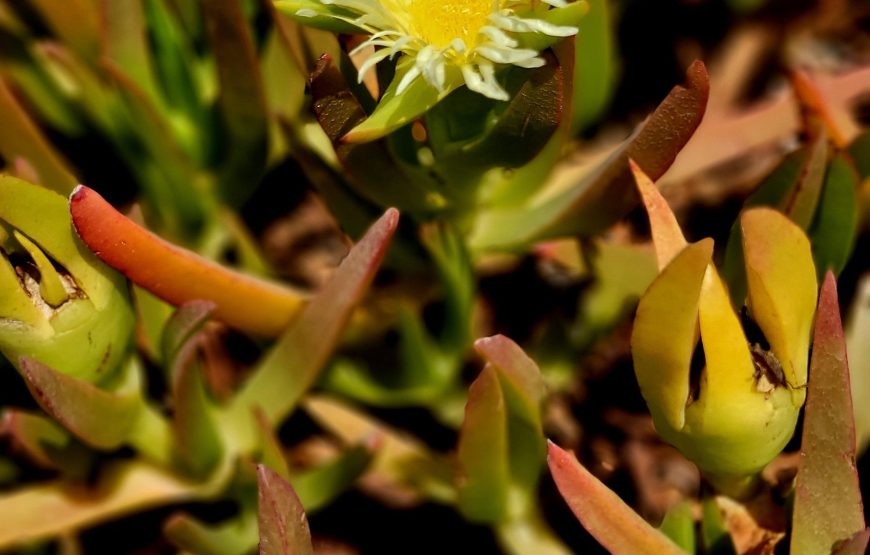
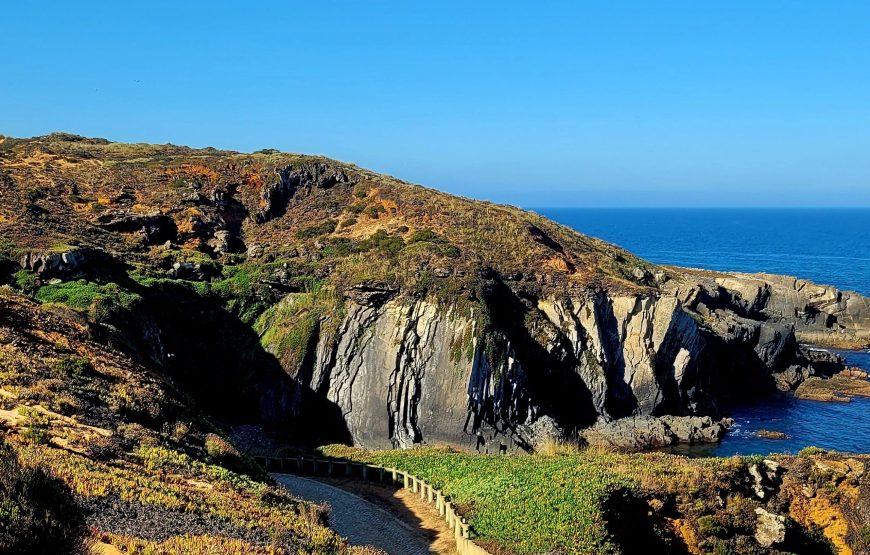
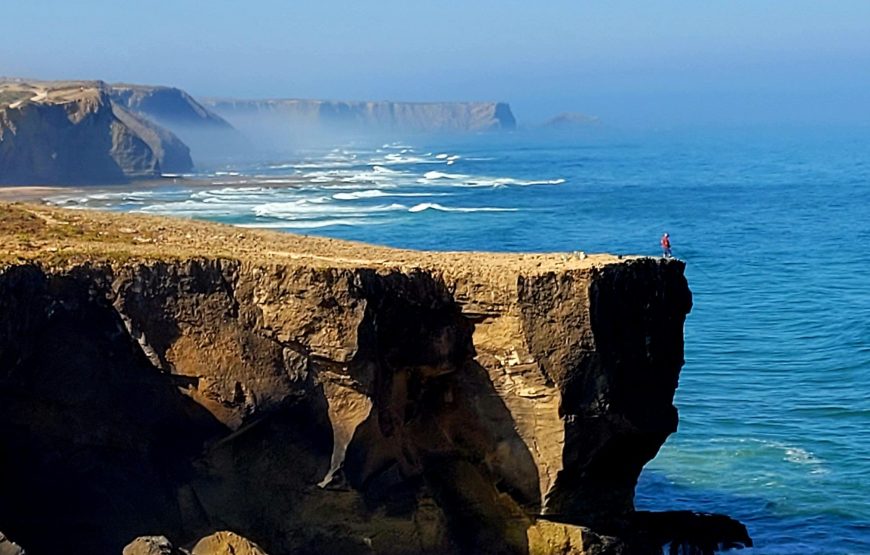
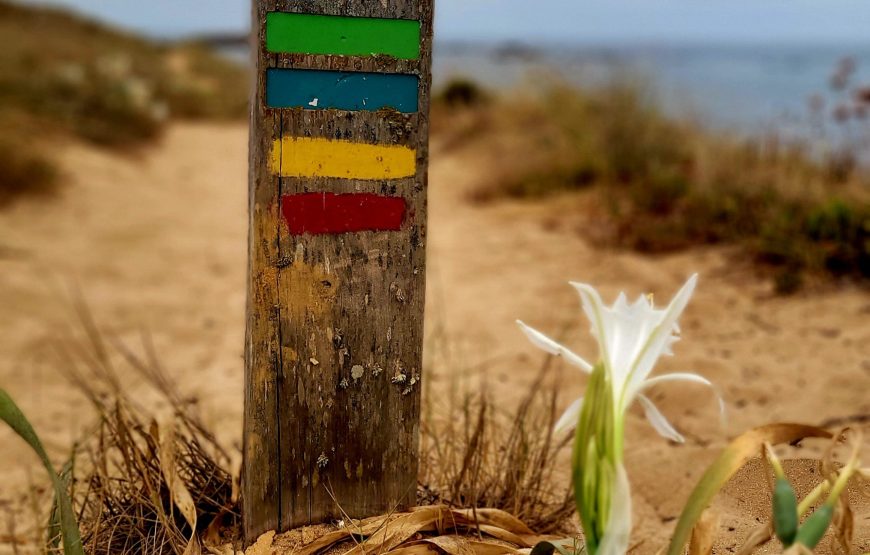
Overview
The Fishermen’s Trail is one of Europe’s most stunning coastal routes, a 14-day journey with 12 walking stages. From Porto Covo to Lagos, you follow the Atlantic coast past cliffs, fishing villages, wide beaches and hidden coves: landscapes once used by local fishermen and now open for you to explore on foot. It’s a route that brings together dramatic scenery, authentic Portuguese culture and the simple joy of walking by the sea, with highlights ranging from stork nests on seaside cliffs to unforgettable sunsets over the ocean.
If you don’t have time for the full 14 days, we also offer a shorter 8-day version from Almograve to Sagres, covering some of the most iconic stretches of the Fishermen’s Trail.
You’ll arrive at either Faro Airport or Lisbon Airport and make your way to the coastal village of Porto Covo. Known for its whitewashed houses, cobbled streets, and stunning Atlantic views, Porto Covo is a peaceful yet atmospheric place to begin your journey. Once you’ve checked into your accommodation, take a stroll through the village, walk along the cliffs to admire the sea, or enjoy fresh seafood at one of the cozy local restaurants. In the evening, relax and get ready for the first stage of your hike the next morning.
Please note: Although the Fishermen’s Trail officially begins in São Torpes, the first 10 kilometers from there pass through an industrial area, and the most scenic landscapes start only after Porto Covo. We recommend skipping this first section and starting your walk in Porto Covo.
Today’s walk is all about the beaches. Leaving Porto Covo, the trail takes you along sand dunes and wide stretches of coast, passing Ilha do Pessegueiro, Aivados and Malhão beaches, as well as hidden coves that appear between the cliffs. The sandy terrain makes this one of the more demanding days, but the variety of landscapes more than rewards the effort. From pebbled shores shaped by the waves to sandstone dunes that slide into the sea, every beach has its own character. Your stage ends in Vila Nova de Milfontes, a lively town at the mouth of the Mira River, where you can enjoy the views and relax after a full day by the ocean.
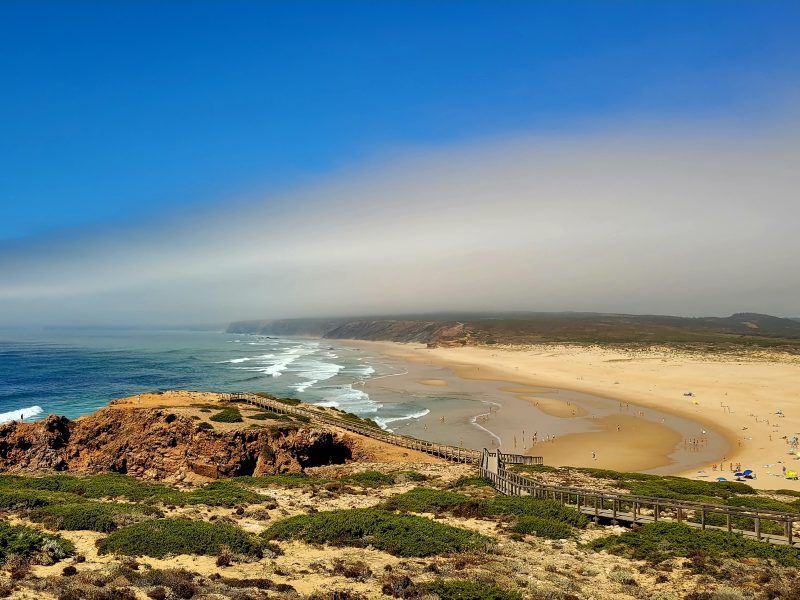
This short stage begins with unforgettable views over Vila Nova de Milfontes and the mouth of the Mira River, where the waters meet the Atlantic. Crossing the bridge gives you a chance to take in the town, the estuary, and the surrounding hillsides. The trail then continues along the coast, where marshes, dunes, and native vegetation provide habitat for many birds and small animals. Between March and October you might see swifts nesting on the cliffs, performing their impressive aerial acrobatics above the ocean. After a relaxed day of walking, you reach Almograve, a quiet village by the sea, with time to enjoy the beach and prepare for the next stage.
Leaving Almograve, the trail leads you through wild coastal scenery with constant views of the Atlantic Ocean, dotted with dunes, colorful flowers in spring, and dramatic rock formations carved by the sea. Along the way you might spot white storks nesting on the cliffs, a unique sight in Europe. Your day ends in the lively seaside village of Zambujeira do Mar, where whitewashed houses overlook the beach and you can enjoy fresh seafood before settling in for the night.
Today’s stage takes you further south along the dramatic Alentejo coast. Leaving Zambujeira do Mar, the route passes secluded coves and natural rock arches, as well as the small fishing harbor of Azenha do Mar, a perfect spot for a pause and a taste of local seafood. As you continue, the scenery opens up to wide beaches and sweeping views before you reach the river Ribeira de Seixe, which marks the natural border between the Alentejo and Algarve regions. Crossing into the Algarve, you’ll arrive in the charming village of Odeceixe, known for its whitewashed houses and its spectacular beach just a short walk from the center.
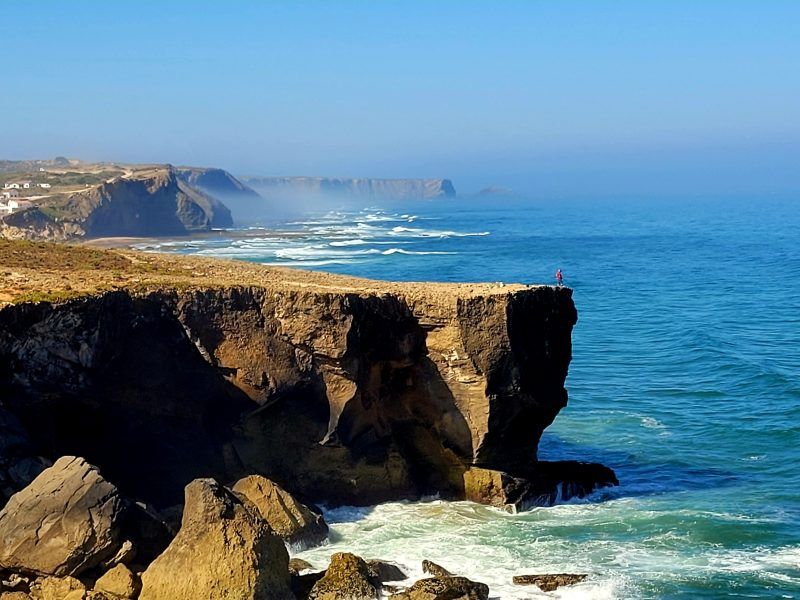
From Odeceixe, the trail leads you into the Algarve, beginning with views over the river mouth and the surrounding hillsides. The walk passes through irrigated fields and coastal heathland, where crops, pastures and patches of forest form a rich natural mosaic. Along the way you’ll notice aromatic plants like rosemary and lavender, as well as wetlands that provide habitat for many bird species. The scenery shifts between farmland, dunes and cliffs until you arrive in Aljezur, a historic town overlooked by the ruins of a Moorish castle, where you can enjoy a well-earned rest.
Leaving the historic town of Aljezur, with its cobbled streets and the ruins of a Moorish castle overlooking the valley, the trail leads you through a peaceful rural landscape of farms, orchards and hills. As you approach the coast, the views open up towards the Atlantic and the cliffs of Arrifana. The stage ends at Praia de Arrifana, a sweeping beach framed by dramatic black cliffs and popular with surfers.
Leaving Arrifana, the cliffs here rise up to 100 meters, revealing spectacular rock folds that tell a geological story dating back more than 300 million years, when the clash of ancient continents shaped these rugged shores. This is a landscape where life has always been tied to both the sea and the land: hardy soils worked near the streams to grow corn, beans and potatoes. The trail itself follows high headlands and sandy tracks with constant views of the Atlantic, a route filled with the scent of coastal scrub and the roar of the waves below. Your day ends in the surf town of Carrapateira, surrounded by dunes and wide beaches, where the pace of life slows and the ocean is always in view.
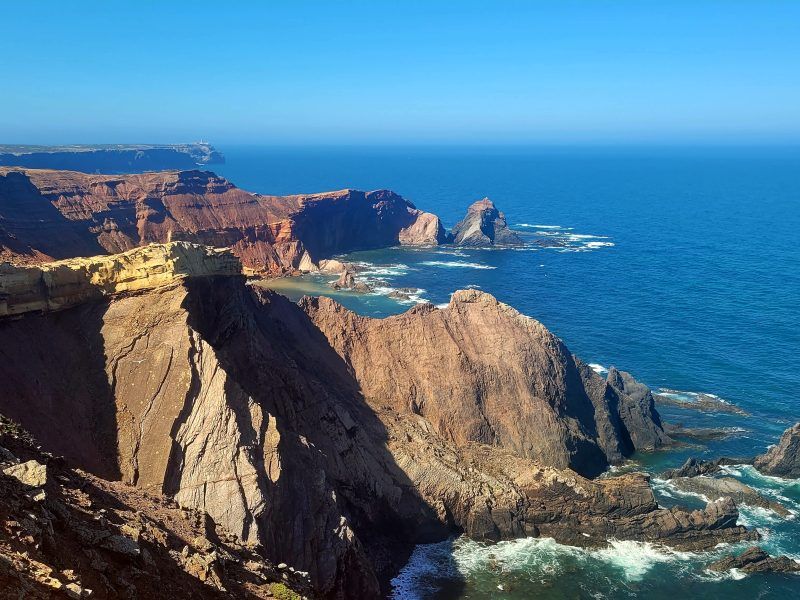
This stage of the Fishermen’s Trail is a feast for the senses, offering some of the most stunning coastal scenes of the entire route. Just when you think you have seen it all, the path reveals more treasures: incredible rock formations and dreamlike beaches such as Amado, Murração and Manteiga, each one an authentic jewel of nature. As the trail reaches the coast near the road to the Fishing Harbor of Forno, take time to explore the archaeological site of Ponta do Castelo.
This coast has been attracting people since prehistory, with Paleolithic stone tools found nearby suggesting seasonal camps. As you continue, especially in spring, the trail bursts with life: wildflowers in bloom, rare and endemic plants unique to this coast, and the busy hum of pollinating insects. Surrounded by such richness, you walk towards the historic town of Vila do Bispo, where the day’s journey ends.
The stage of the Fishermen’s Trail brings you to the extreme southwest of Europe, a place where culture, geology and biodiversity come together in a landscape unlike any other. The coast around Sagres and Cabo de São Vicente is shaped by a unique climate, chalky soils and the ever-present sea. It was declared the Sagres Biogenetic Reserve in 1988 and is home to rare and endemic plants found only in this part of Portugal. Along the way you pass remarkable geological treasures. However, this dramatic setting is not only a geological wonder but also a paradise for birdwatchers. Sagres is one of the best places in Europe to observe migratory seabirds such as shearwaters, terns, skuas and gulls. On calmer days you may even spot dolphins gliding through the waters below.
This stage is one of the toughest of the Fishermen’s Trail, but also among the most rewarding. Leaving Sagres, the path follows towering limestone cliffs and passes a string of beautiful beaches, including Martinhal, Ingrina, Zavial, Furnas, Figueira and finally Salema. Along the way, you’ll encounter diverse habitats such as lagoons, dunes, marshes and rocky coves, making this a rich area for birdwatching and marine life. The coastline is also full of history, from ancient Roman remains to old fortifications that once guarded the shore. By the time you reach Salema, with its golden sands and fishing village charm, you will have completed one of the most dramatic stretches of the entire route.
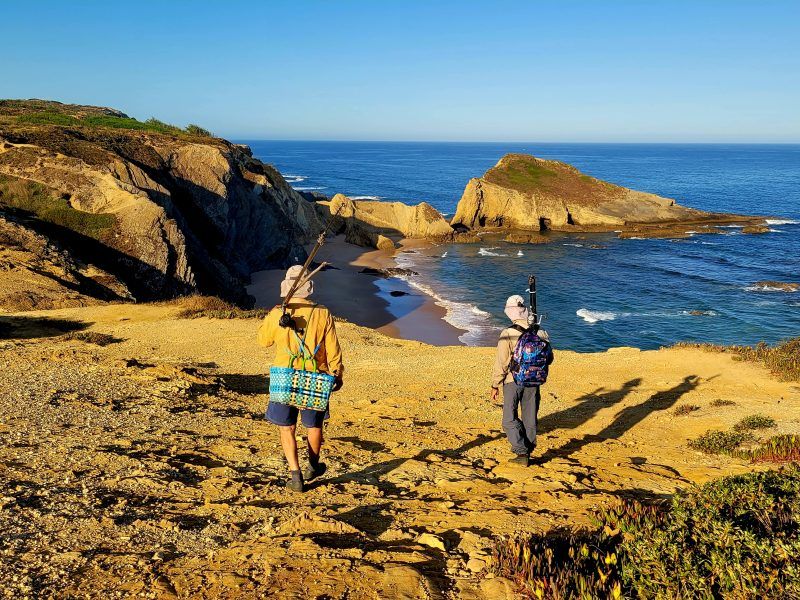
On this stage, the last within the Natural Park, the trail continues along cliffs rich in vegetation and birdlife. With binoculars in hand, you may spot herons, egrets and other coastal species, especially in the early morning. The route passes Boca do Rio, where streams form wetlands that shelter a surprising diversity of plants and animals, and where traces of a Roman villa can still be seen. History is never far away here, with old forts, tales of pirates and shipwrecks giving the landscape an added layer of fascination. After a rewarding walk, you arrive in Luz, a coastal village with a wide sandy beach and a relaxed atmosphere.
The final walking stage of the Fishermen’s Trail leads from Luz to the historic city of Lagos. Along the way, the cliffs reveal striking colors and shapes, with layers of limestone and volcanic rock telling stories that go back millions of years. The highlight of this section is the dramatic coastline around Ponta da Piedade, with its arches, grottoes and rock formations sculpted by wind and sea. Arriving in Lagos, you are welcomed by sweeping views of Meia Praia and the city’s maritime heritage, once the starting point of Portugal’s Age of Discoveries. It’s the perfect place to celebrate the end of your journey, with lively streets, cultural sights and the Atlantic always close by.
After breakfast, your journey along the Fishermen’s Trail comes to an end. From Lagos, with its lively marina and historic old town, you can continue your travels or head to the airport for your flight home. Take a moment to reflect on the week’s adventure: the cliffs, beaches, wildlife and villages that shaped your walk, and carry the spirit of the Atlantic coast with you as you set off on your next journey!
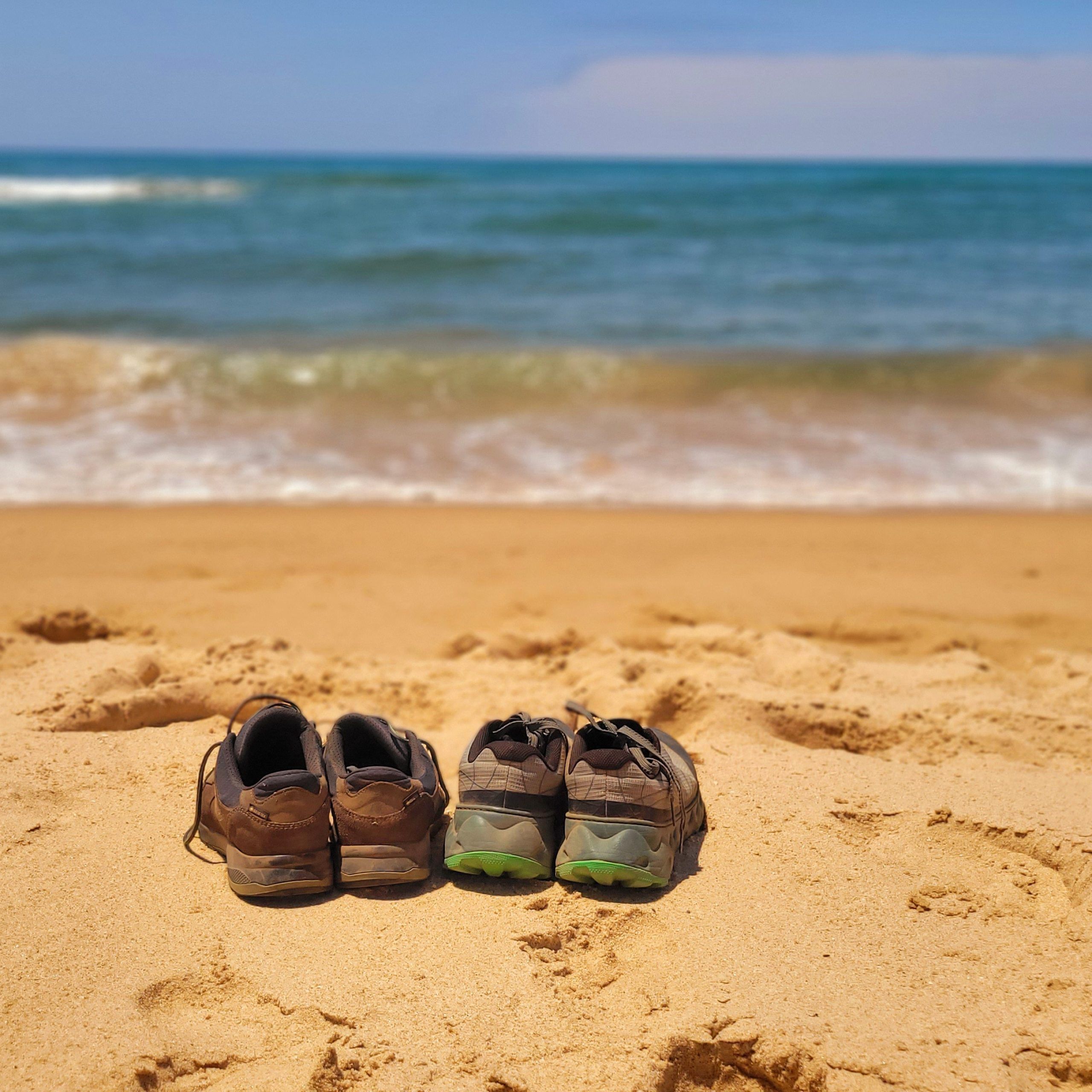
You’ll arrive at either Faro Airport or Lisbon Airport and make your way to the coastal village of Porto Covo. Known for its whitewashed houses, cobbled streets, and stunning Atlantic views, Porto Covo is a peaceful yet atmospheric place to begin your journey. Once you’ve checked into your accommodation, take a stroll through the village, walk along the cliffs to admire the sea, or enjoy fresh seafood at one of the cozy local restaurants. In the evening, relax and get ready for the first stage of your hike the next morning.
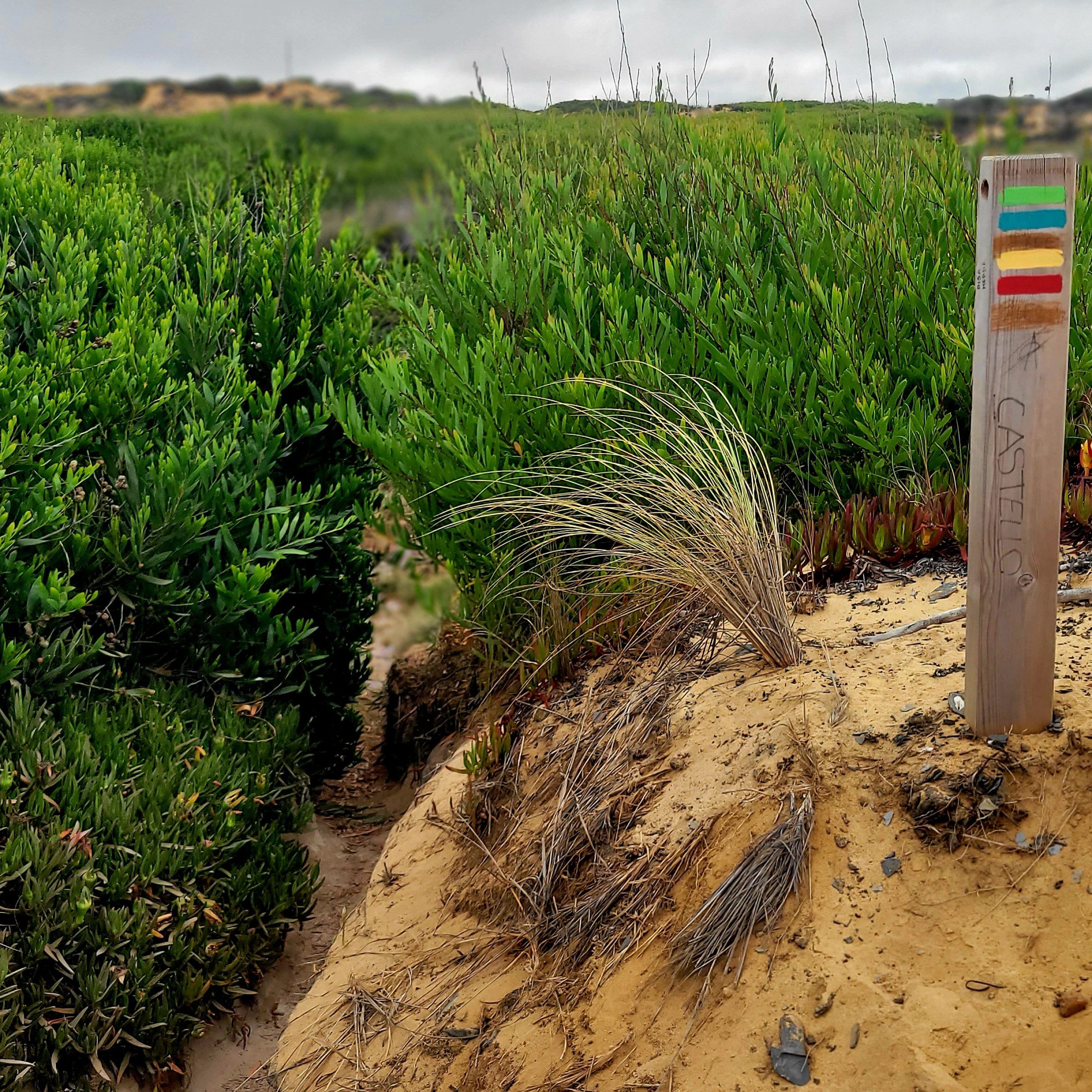
Today’s walk is all about the beaches. Leaving Porto Covo, the trail takes you along sand dunes and wide stretches of coast, passing Ilha do Pessegueiro, Aivados and Malhão beaches, as well as hidden coves that appear between the cliffs. The sandy terrain makes this one of the more demanding days, but the variety of landscapes more than rewards the effort. From pebbled shores shaped by the waves to sandstone dunes that slide into the sea, every beach has its own character. Your stage ends in Vila Nova de Milfontes, a lively town at the mouth of the Mira River, where you can enjoy the views and relax after a full day by the ocean.
Please note: Although the Fishermen’s Trail officially begins in São Torpes, the first 10 kilometers from there pass through an industrial area, and the most scenic landscapes start only after Porto Covo. We recommend skipping this first section and starting your walk in Porto Covo.
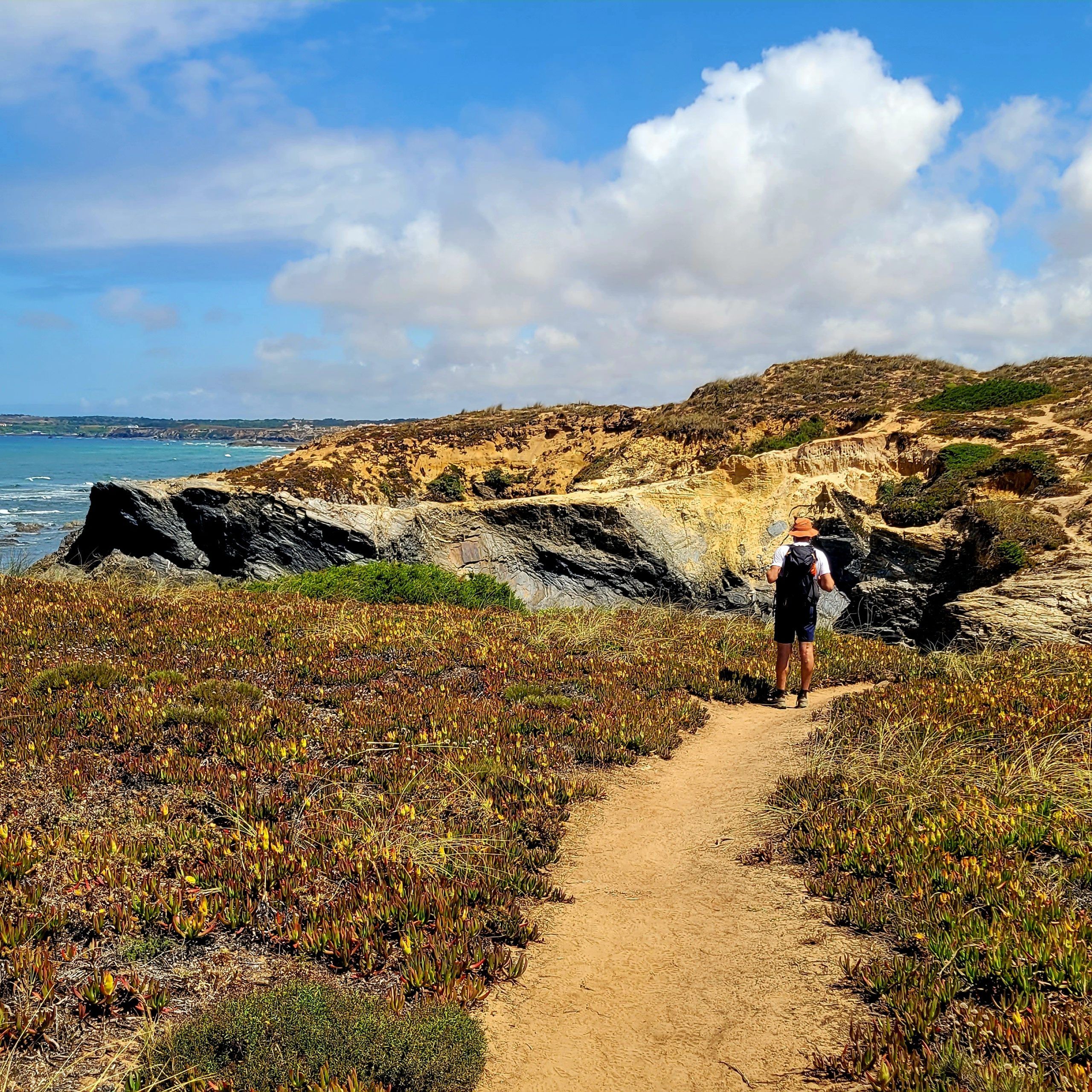
This short stage begins with unforgettable views over Vila Nova de Milfontes and the mouth of the Mira River, where the waters meet the Atlantic. Crossing the bridge gives you a chance to take in the town, the estuary, and the surrounding hillsides. The trail then continues along the coast, where marshes, dunes, and native vegetation provide habitat for many birds and small animals. Between March and October you might see swifts nesting on the cliffs, performing their impressive aerial acrobatics above the ocean. After a relaxed day of walking, you reach Almograve, a quiet village by the sea, with time to enjoy the beach and prepare for the next stage.
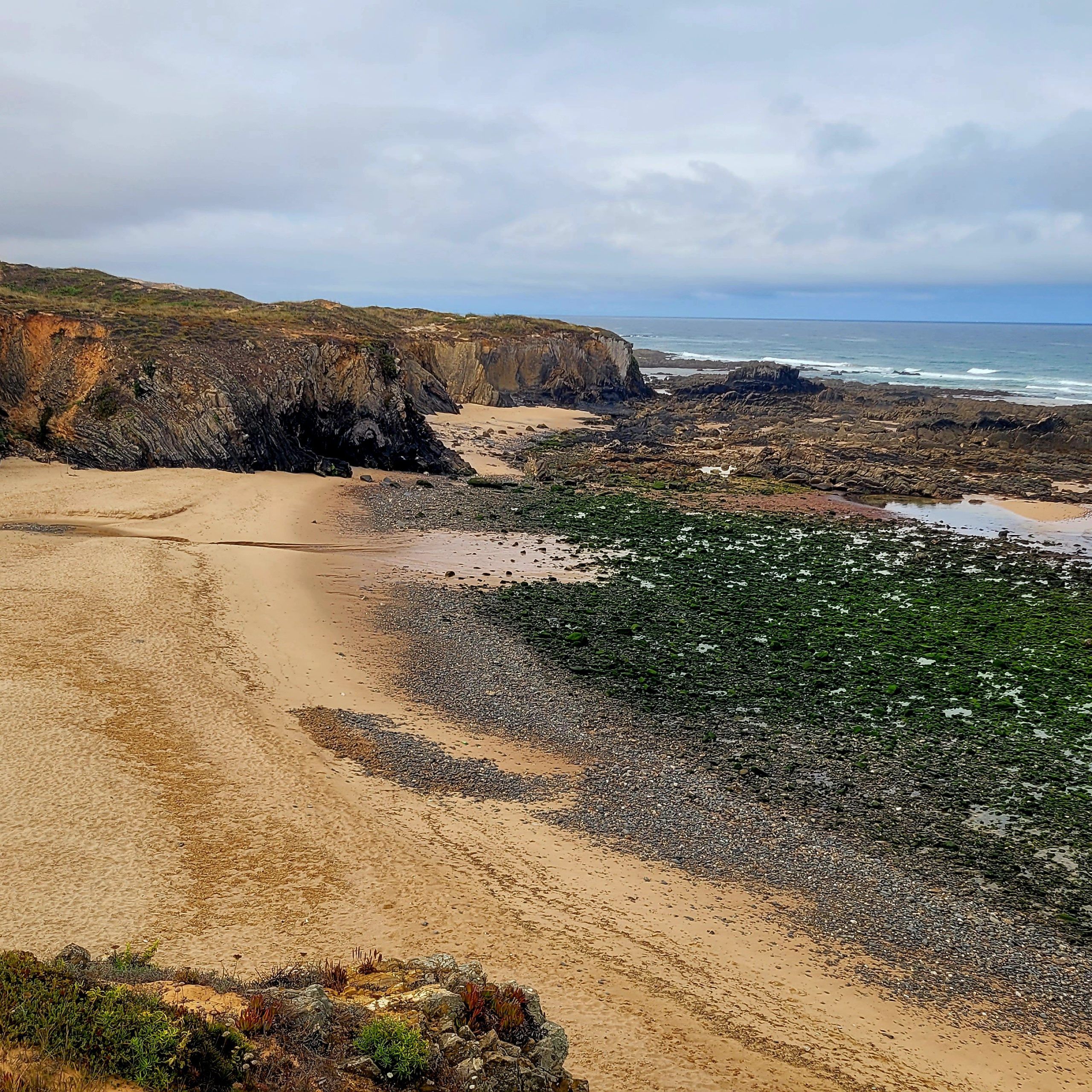
Leaving Almograve, the trail leads you through wild coastal scenery with constant views of the Atlantic Ocean, dotted with dunes, colorful flowers in spring, and dramatic rock formations carved by the sea. Along the way you might spot white storks nesting on the cliffs, a unique sight in Europe. Your day ends in the lively seaside village of Zambujeira do Mar, where whitewashed houses overlook the beach and you can enjoy fresh seafood before settling in for the night.
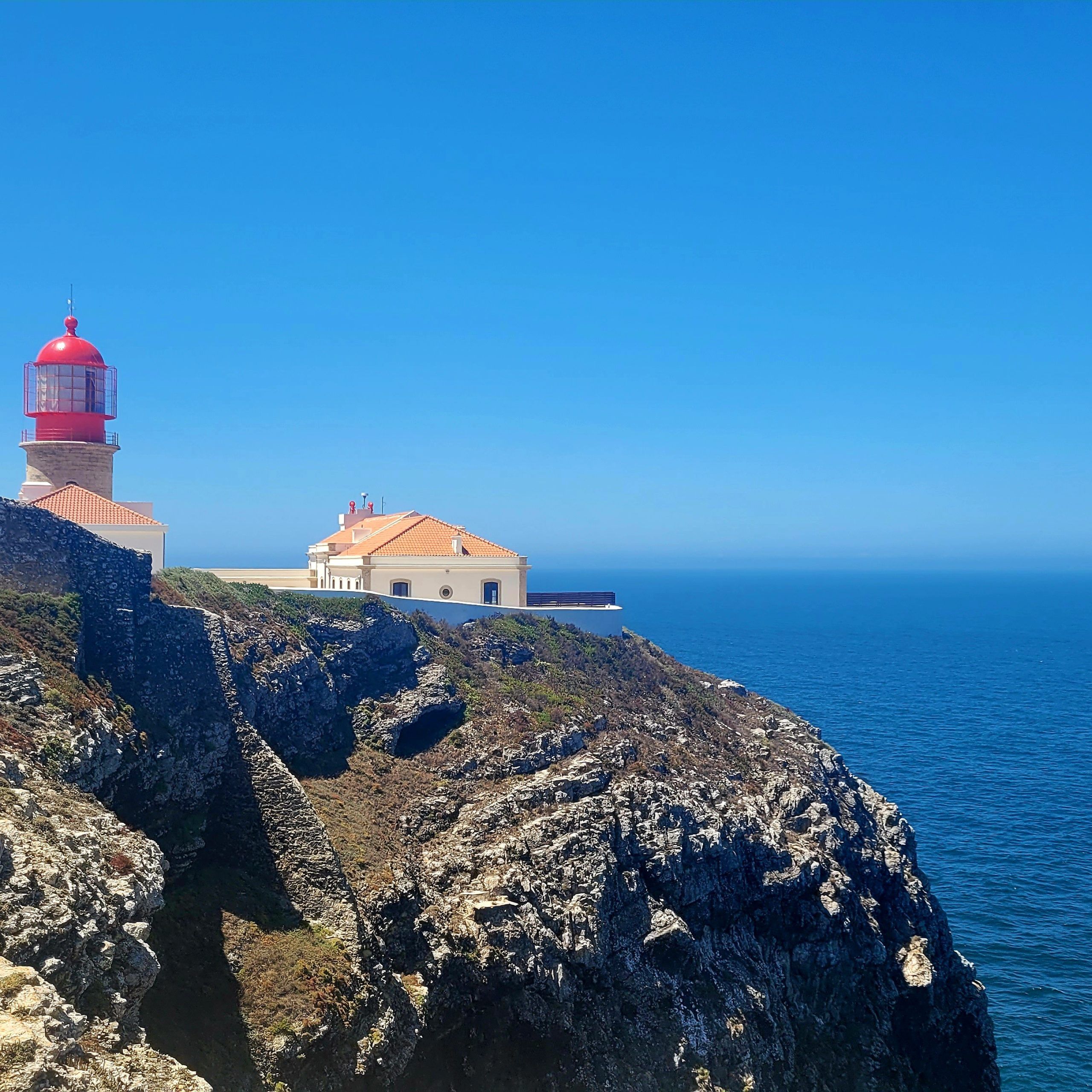
Today’s stage takes you further south along the dramatic Alentejo coast. Leaving Zambujeira do Mar, the route passes secluded coves and natural rock arches, as well as the small fishing harbor of Azenha do Mar, a perfect spot for a pause and a taste of local seafood. As you continue, the scenery opens up to wide beaches and sweeping views before you reach the river Ribeira de Seixe, which marks the natural border between the Alentejo and Algarve regions. Crossing into the Algarve, you’ll arrive in the charming village of Odeceixe, known for its whitewashed houses and its spectacular beach just a short walk from the center.
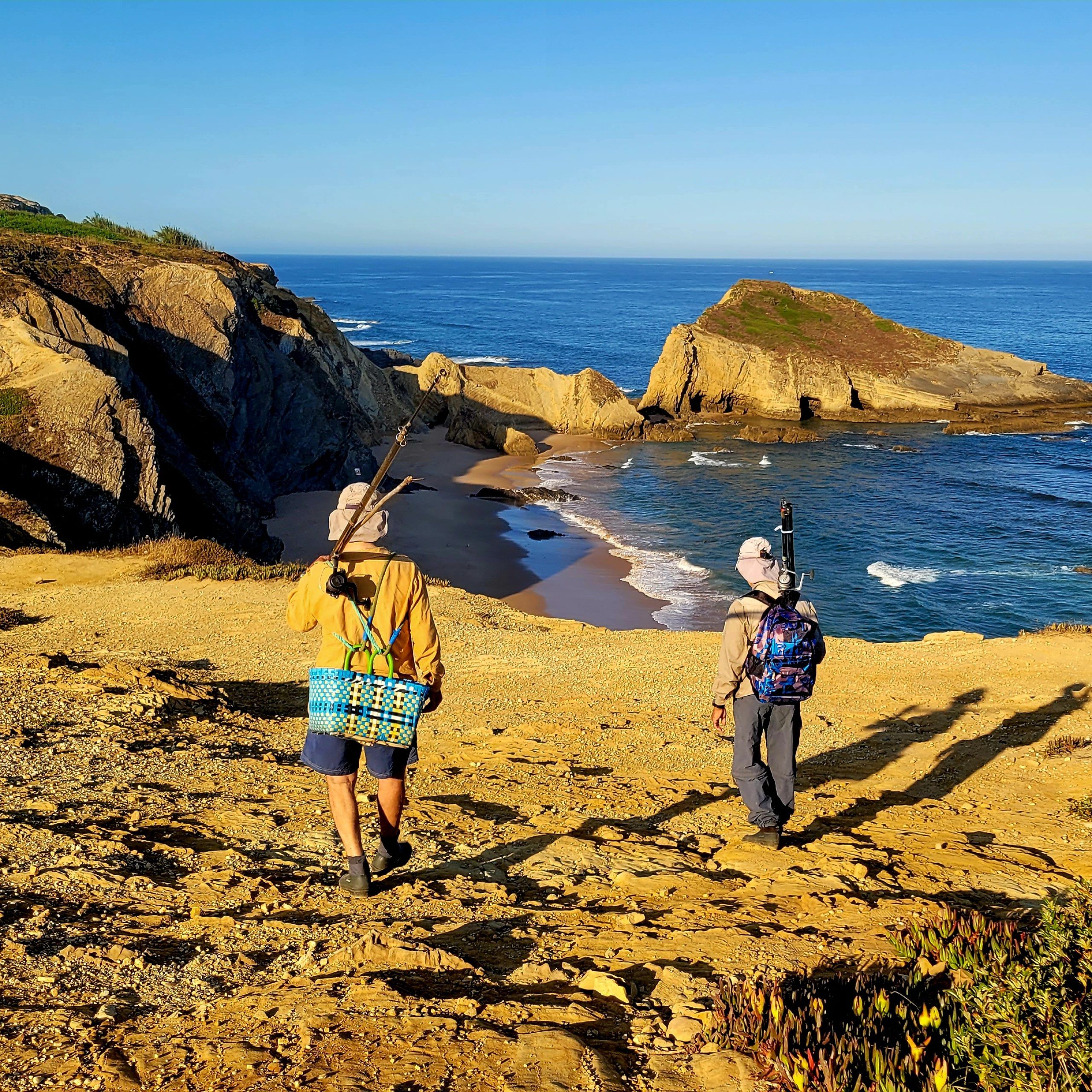
From Odeceixe, the trail leads you into the Algarve, beginning with views over the river mouth and the surrounding hillsides. The walk passes through irrigated fields and coastal heathland, where crops, pastures and patches of forest form a rich natural mosaic. Along the way you’ll notice aromatic plants like rosemary and lavender, as well as wetlands that provide habitat for many bird species. The scenery shifts between farmland, dunes and cliffs until you arrive in Aljezur, a historic town overlooked by the ruins of a Moorish castle, where you can enjoy a well-earned rest.
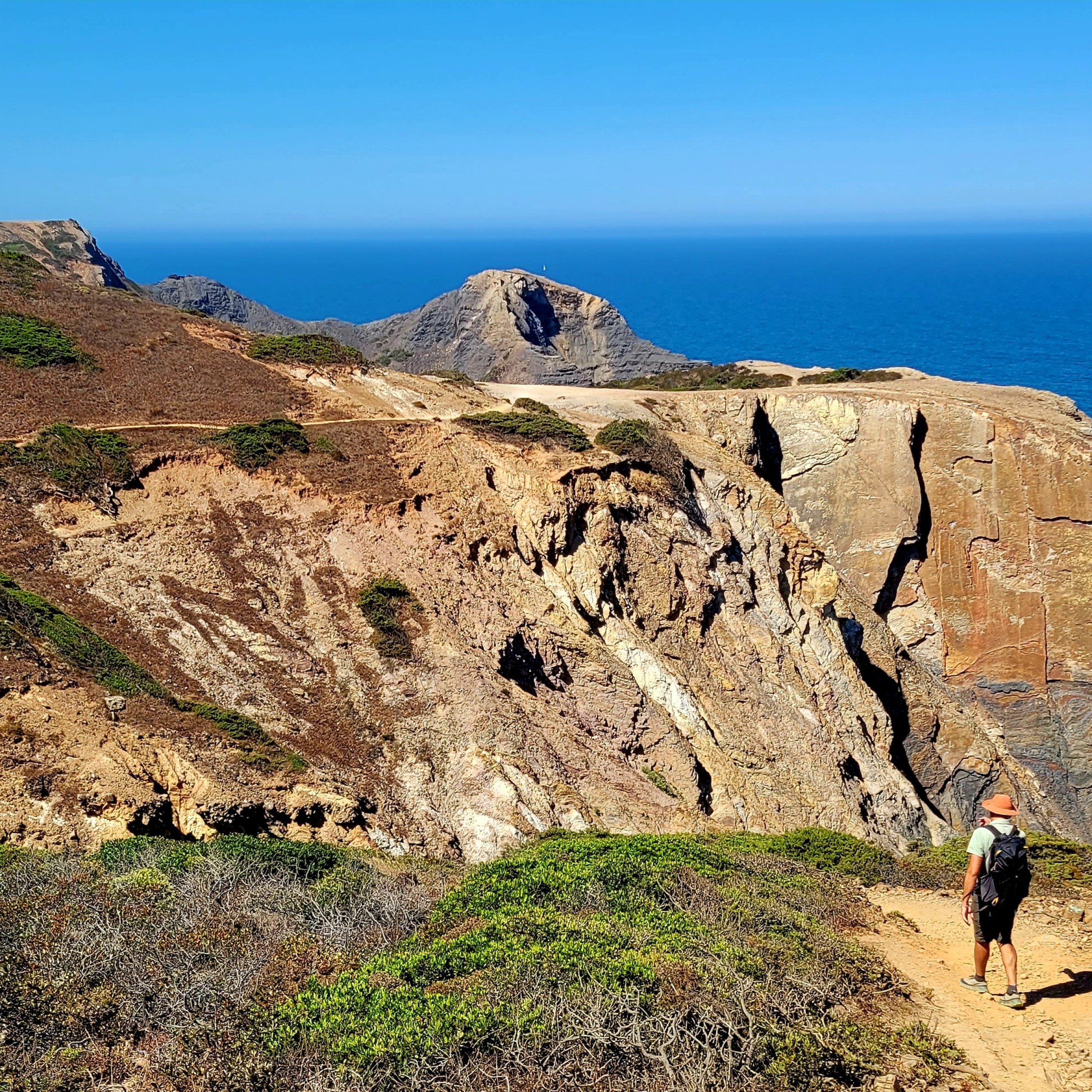
Leaving the historic town of Aljezur, with its cobbled streets and the ruins of a Moorish castle overlooking the valley, the trail leads you through a peaceful rural landscape of farms, orchards and hills. As you approach the coast, the views open up towards the Atlantic and the cliffs of Arrifana. The stage ends at Praia de Arrifana, a sweeping beach framed by dramatic black cliffs and popular with surfers.
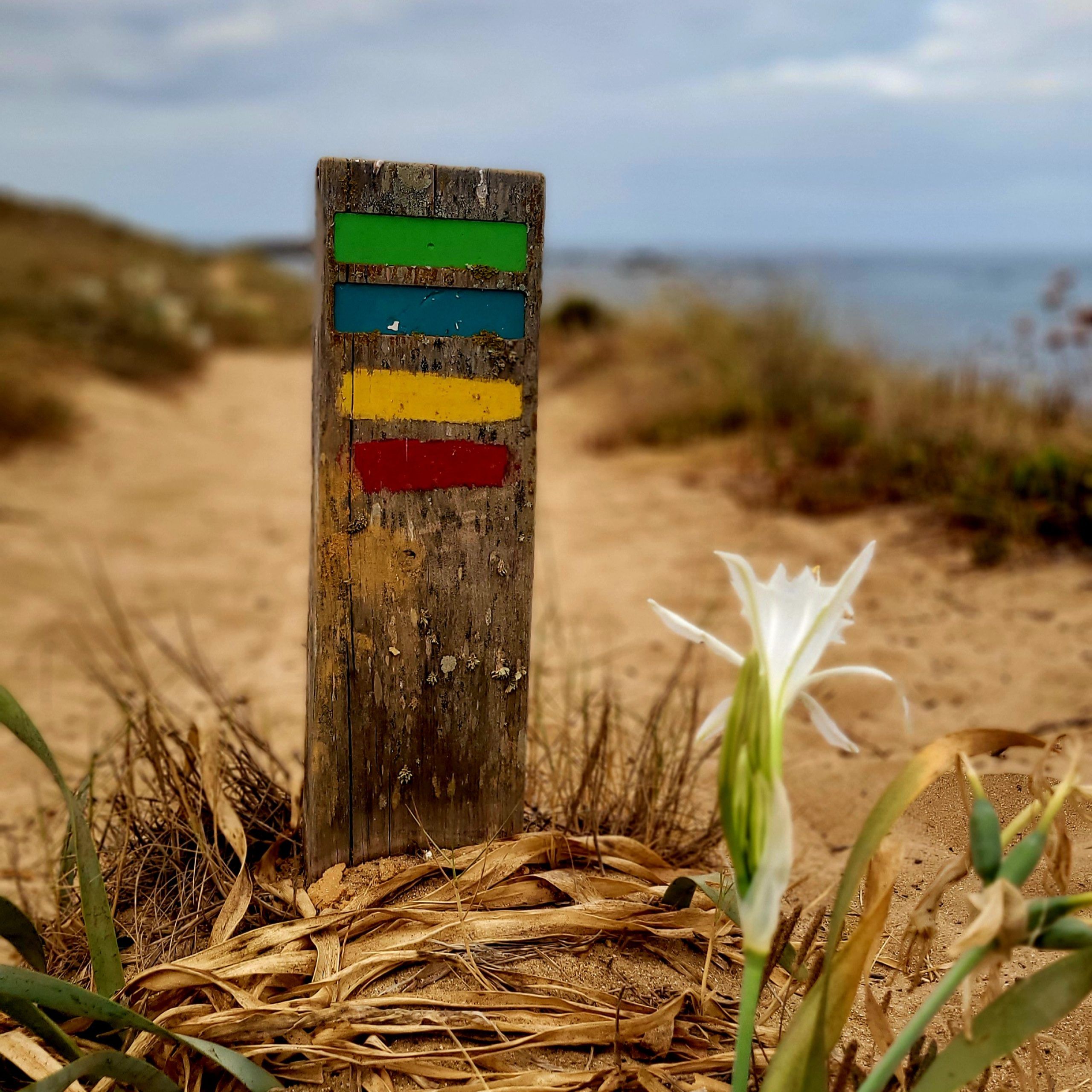
Leaving Arrifana, the cliffs here rise up to 100 meters, revealing spectacular rock folds that tell a geological story dating back more than 300 million years, when the clash of ancient continents shaped these rugged shores. This is a landscape where life has always been tied to both the sea and the land: hardy soils worked near the streams to grow corn, beans and potatoes. The trail itself follows high headlands and sandy tracks with constant views of the Atlantic, a route filled with the scent of coastal scrub and the roar of the waves below. Your day ends in the surf town of Carrapateira, surrounded by dunes and wide beaches, where the pace of life slows and the ocean is always in view.

This stage of the Fishermen’s Trail is a feast for the senses, offering some of the most stunning coastal scenes of the entire route. Just when you think you have seen it all, the path reveals more treasures: incredible rock formations and dreamlike beaches such as Amado, Murração and Manteiga, each one an authentic jewel of nature. As the trail reaches the coast near the road to the Fishing Harbor of Forno, take time to explore the archaeological site of Ponta do Castelo.
This coast has been attracting people since prehistory, with Paleolithic stone tools found nearby suggesting seasonal camps. As you continue, especially in spring, the trail bursts with life: wildflowers in bloom, rare and endemic plants unique to this coast, and the busy hum of pollinating insects. Surrounded by such richness, you walk towards the historic town of Vila do Bispo, where the day’s journey ends.
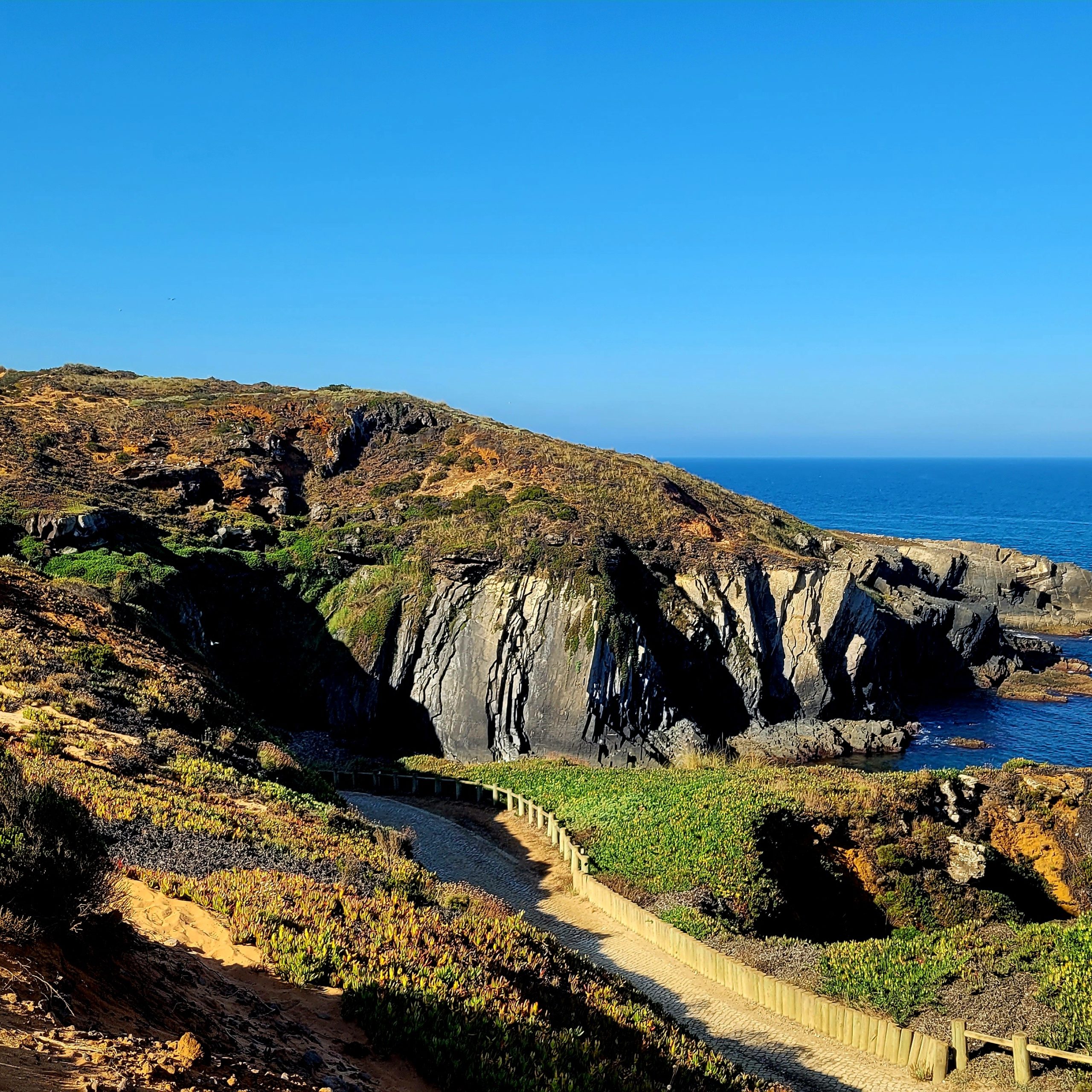
The stage of the Fishermen’s Trail brings you to the extreme southwest of Europe, a place where culture, geology and biodiversity come together in a landscape unlike any other. The coast around Sagres and Cabo de São Vicente is shaped by a unique climate, chalky soils and the ever-present sea. It was declared the Sagres Biogenetic Reserve in 1988 and is home to rare and endemic plants found only in this part of Portugal. Along the way you pass remarkable geological treasures. However, this dramatic setting is not only a geological wonder but also a paradise for birdwatchers. Sagres is one of the best places in Europe to observe migratory seabirds such as shearwaters, terns, skuas and gulls. On calmer days you may even spot dolphins gliding through the waters below.
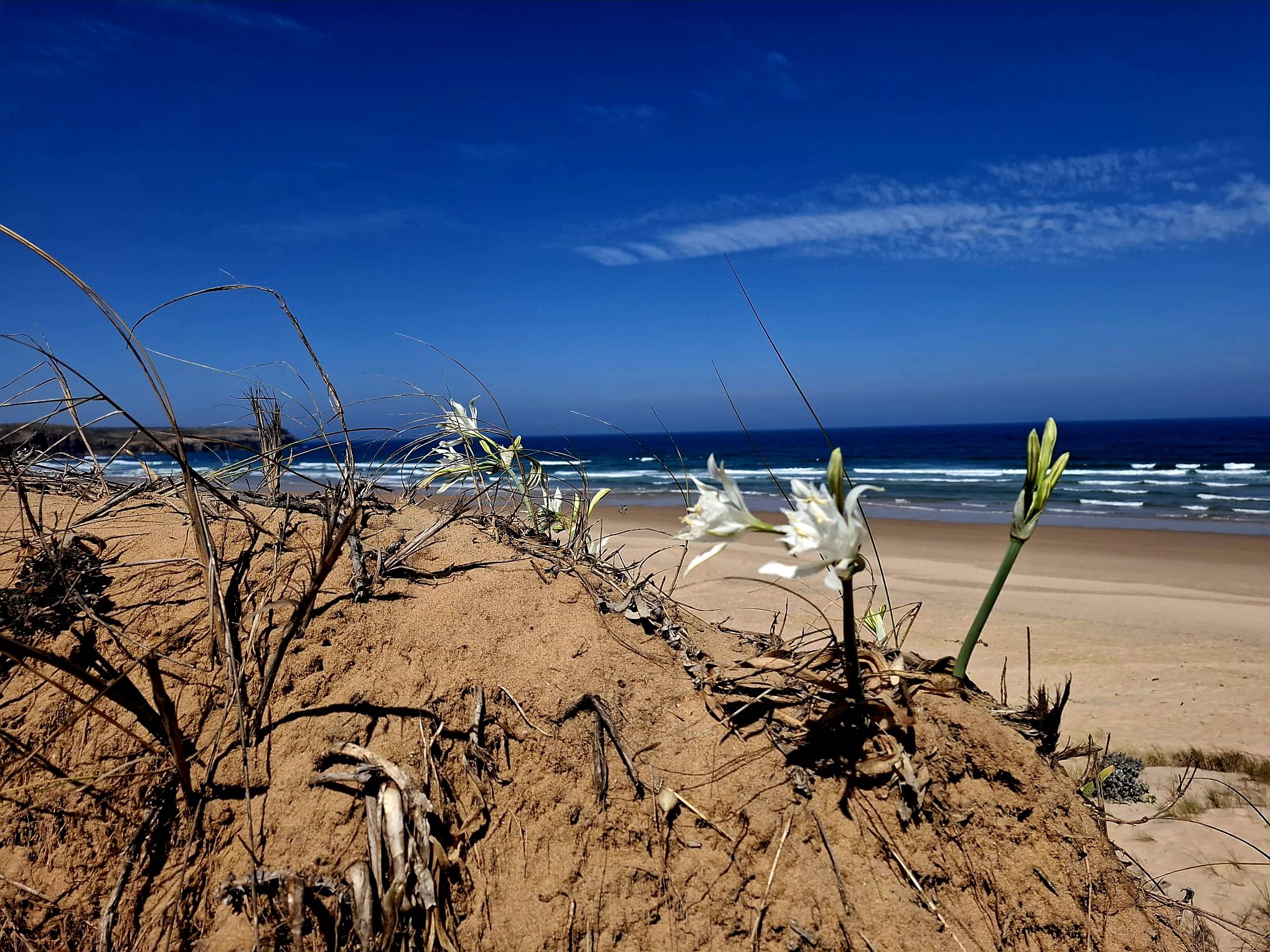
This stage is one of the toughest of the Fishermen’s Trail, but also among the most rewarding. Leaving Sagres, the path follows towering limestone cliffs and passes a string of beautiful beaches, including Martinhal, Ingrina, Zavial, Furnas, Figueira and finally Salema. Along the way, you’ll encounter diverse habitats such as lagoons, dunes, marshes and rocky coves, making this a rich area for birdwatching and marine life. The coastline is also full of history, from ancient Roman remains to old fortifications that once guarded the shore. By the time you reach Salema, with its golden sands and fishing village charm, you will have completed one of the most dramatic stretches of the entire route.
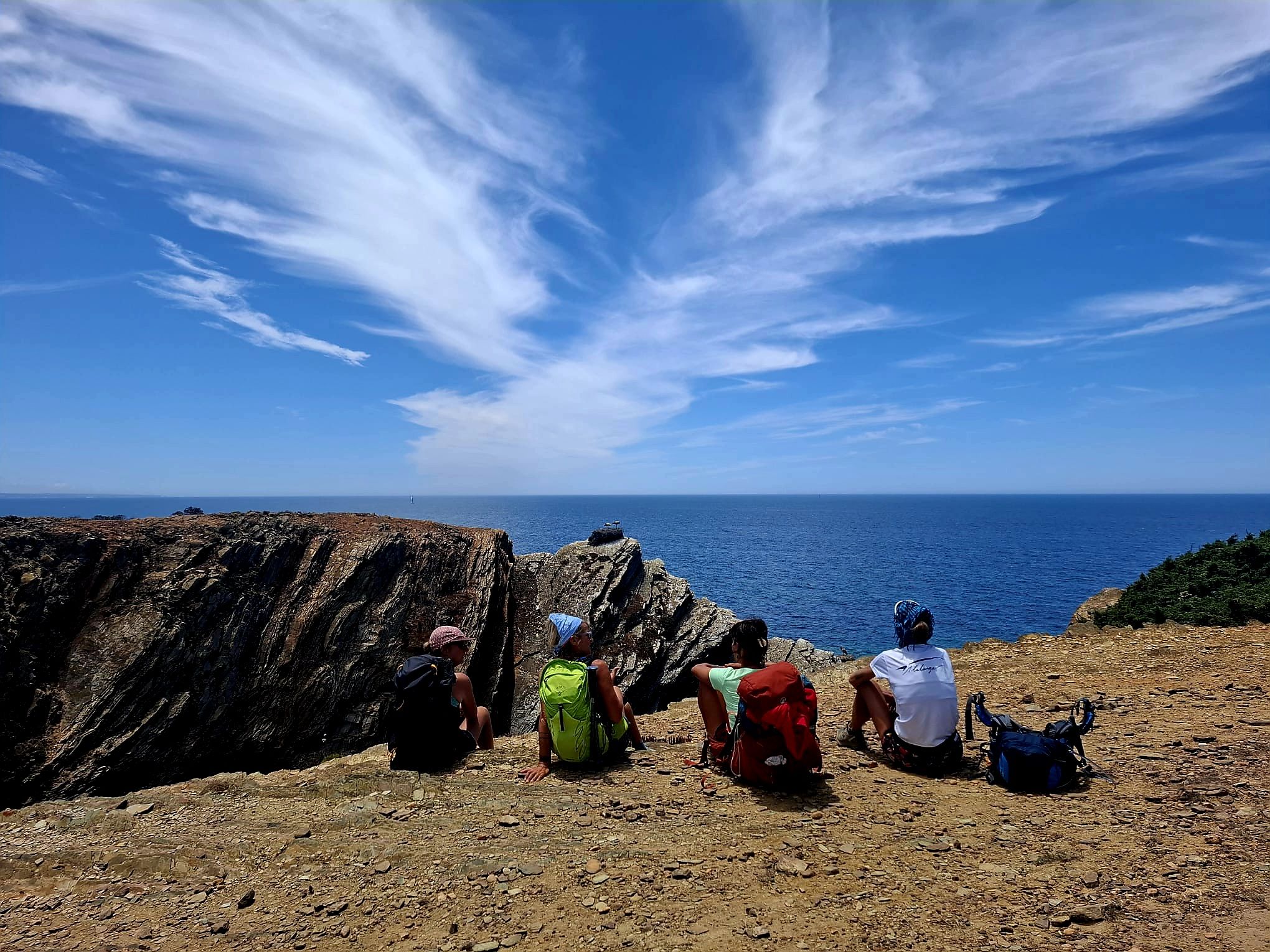
On this stage, the last within the Natural Park, the trail continues along cliffs rich in vegetation and birdlife. With binoculars in hand, you may spot herons, egrets and other coastal species, especially in the early morning. The route passes Boca do Rio, where streams form wetlands that shelter a surprising diversity of plants and animals, and where traces of a Roman villa can still be seen. History is never far away here, with old forts, tales of pirates and shipwrecks giving the landscape an added layer of fascination. After a rewarding walk, you arrive in Luz, a coastal village with a wide sandy beach and a relaxed atmosphere.
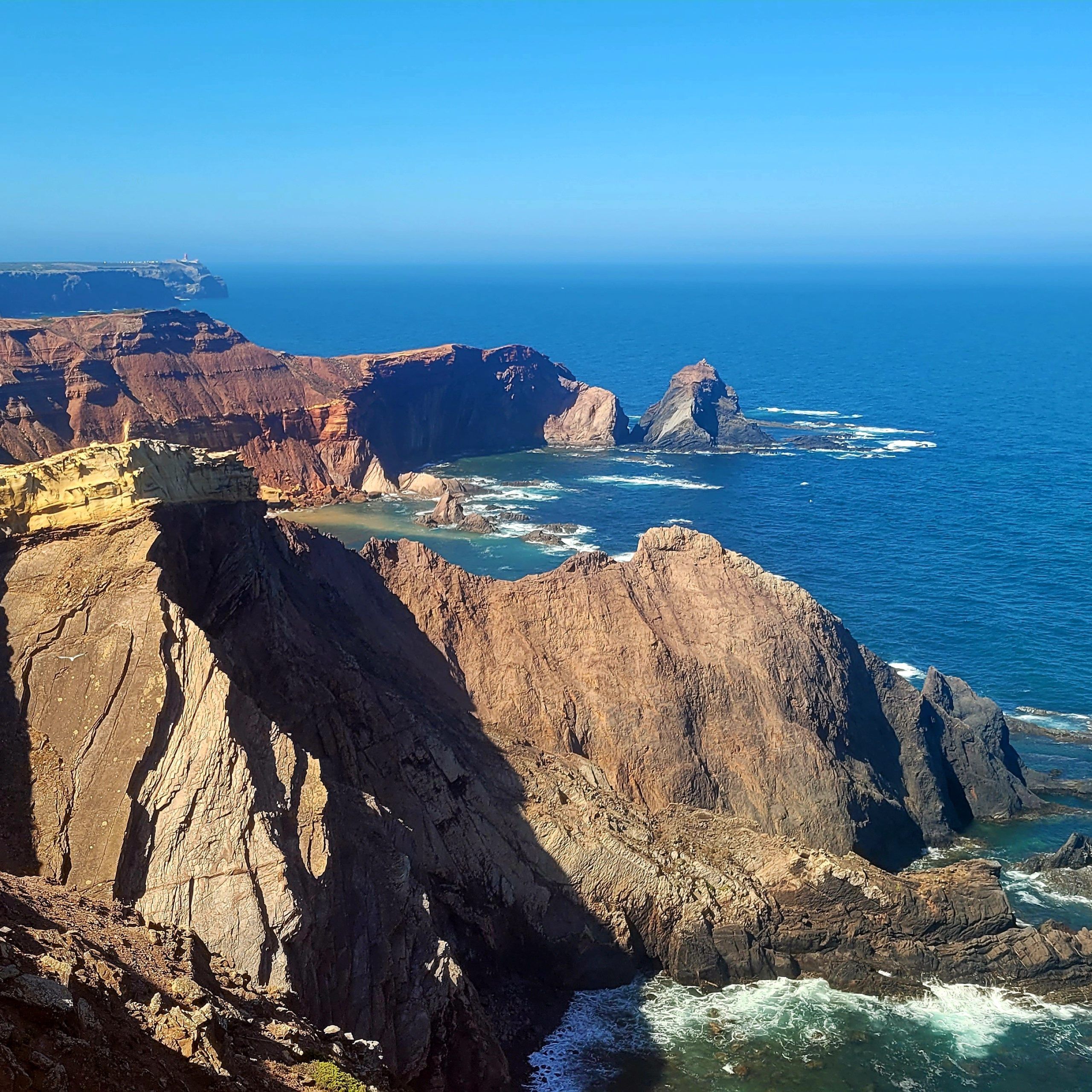
The final walking stage of the Fishermen’s Trail leads from Luz to the historic city of Lagos. Along the way, the cliffs reveal striking colors and shapes, with layers of limestone and volcanic rock telling stories that go back millions of years. The highlight of this section is the dramatic coastline around Ponta da Piedade, with its arches, grottoes and rock formations sculpted by wind and sea. Arriving in Lagos, you are welcomed by sweeping views of Meia Praia and the city’s maritime heritage, once the starting point of Portugal’s Age of Discoveries. It’s the perfect place to celebrate the end of your journey, with lively streets, cultural sights and the Atlantic always close by.
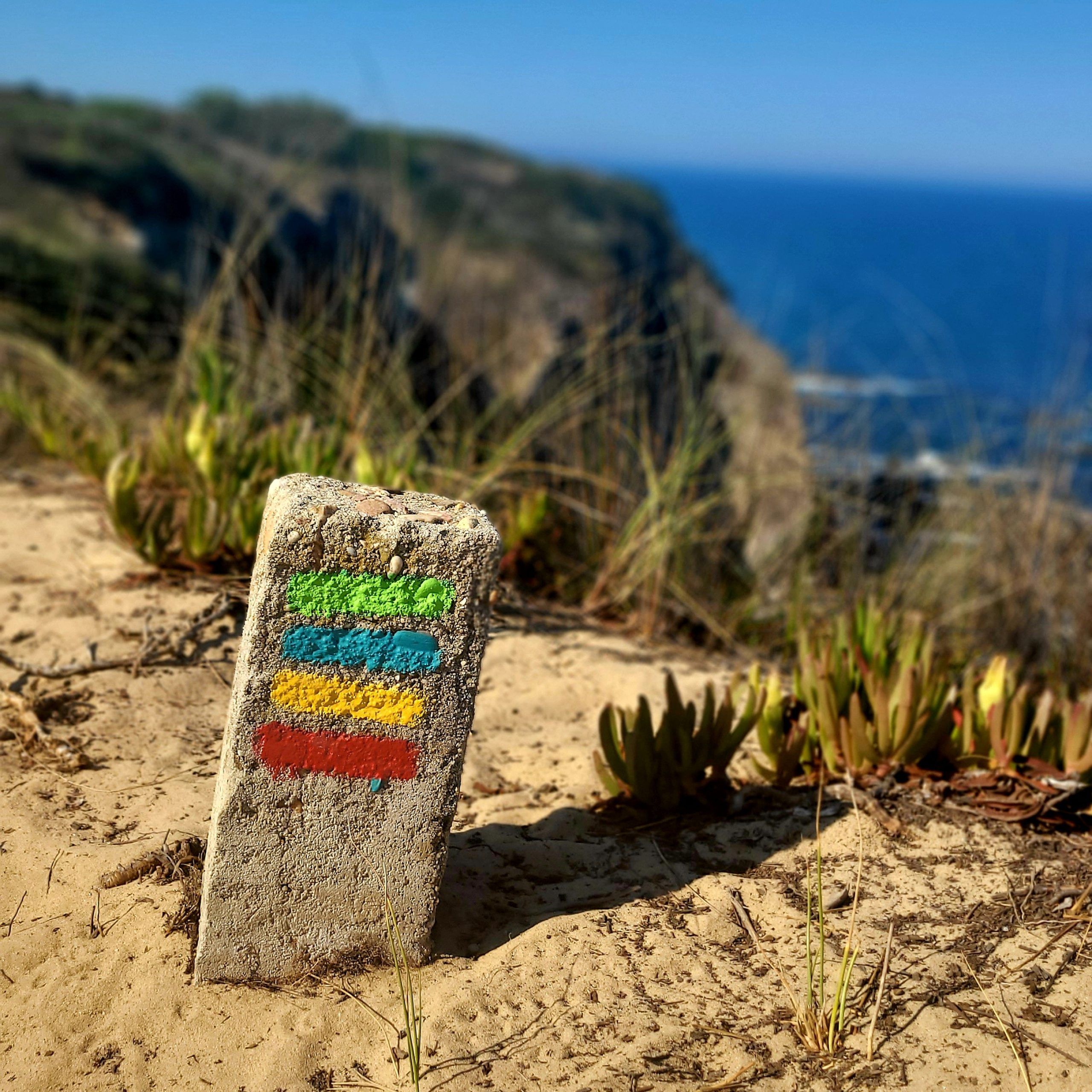
After breakfast, your journey along the Fishermen’s Trail comes to an end. From Lagos, with its lively marina and historic old town, you can continue your travels or head to the airport for your flight home. Take a moment to reflect on the week’s adventure: the cliffs, beaches, wildlife and villages that shaped your walk, and carry the spirit of the Atlantic coast with you as you set off on your next journey!
The Fishermen’s Trail is moderately challenging. Daily distances range from 14 to 22 km, mostly along sandy dunes (that is quit hard), cliffs, and coastal trails. Some sections are exposed with little shade, so a good level of fitness and some prior hiking experience are recommended.
Yes! Your main luggage will be transported from accommodation to accommodation, so you only need to carry a daypack while hiking.
You’ll stay in a mix of comfortable guesthouses, boutique hotels, and small locally run accommodations. All are chosen for their quality and charm.
Breakfast is included daily. For lunch and dinner, you can enjoy meals at local restaurants or cafés along the route.
The Fishermen’s Trail is part of the Rota Vicentina network and is clearly marked with blue and green signs that are easy to follow.
Porto Covo marks the beginning of the most scenic part of the Fishermen’s Trail. The first section from São Torpes passes through an industrial area, so most hikers prefer to start in Porto Covo, where the coastal landscapes truly begin.
The best months to hike the Fishermen’s Trail are from September to June. Summer can be very hot, and the sandy paths make walking more strenuous in high temperatures.
Good hiking shoes, a daypack, sun protection, refillable water bottles, and layered clothing. Hiking poles are optional but can be helpful in sandy terrain.
You can arrive via Lisbon or Faro Airport. We can include transfers from your arrival airport to Porto Covo at the start, and from Lagos back to the airport after the hike ends.
Expect to walk 14–22 km (8.7–13.6 miles) per day. The terrain is sandy with coastal cliffs, occasional ups and downs, and little shade.
Yes! We’re happy to help arrange extra nights before or after your hike so you can relax on the beach or explore more of the region at your own pace.
Although the Fishermen’s Trail is accessible to most hikers, prior experience with multi-day walks and good physical fitness are recommended.
You can contact us at any time, and we will advise you on how to solve the problem.